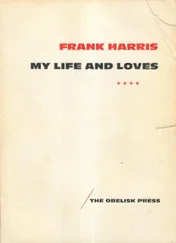Frank Harris - My life and loves Vol. 4
Здесь есть возможность читать онлайн «Frank Harris - My life and loves Vol. 4» весь текст электронной книги совершенно бесплатно (целиком полную версию без сокращений). В некоторых случаях можно слушать аудио, скачать через торрент в формате fb2 и присутствует краткое содержание. Жанр: Эротика, Секс, на английском языке. Описание произведения, (предисловие) а так же отзывы посетителей доступны на портале библиотеки ЛибКат.
- Название:My life and loves Vol. 4
- Автор:
- Жанр:
- Год:неизвестен
- ISBN:нет данных
- Рейтинг книги:4 / 5. Голосов: 1
-
Избранное:Добавить в избранное
- Отзывы:
-
Ваша оценка:
- 80
- 1
- 2
- 3
- 4
- 5
My life and loves Vol. 4: краткое содержание, описание и аннотация
Предлагаем к чтению аннотацию, описание, краткое содержание или предисловие (зависит от того, что написал сам автор книги «My life and loves Vol. 4»). Если вы не нашли необходимую информацию о книге — напишите в комментариях, мы постараемся отыскать её.
My life and loves Vol. 4 — читать онлайн бесплатно полную книгу (весь текст) целиком
Ниже представлен текст книги, разбитый по страницам. Система сохранения места последней прочитанной страницы, позволяет с удобством читать онлайн бесплатно книгу «My life and loves Vol. 4», без необходимости каждый раз заново искать на чём Вы остановились. Поставьте закладку, и сможете в любой момент перейти на страницу, на которой закончили чтение.
Интервал:
Закладка:
There comes a cloud upon the plain, and the Don immediately takes it for the paynim host who have come out to fight him. Sancho Panza, the squire, says it smells badly and may well be the pagans, so skins up a tree to be safe. Don Quixote lays his lance in rest and spurs out to combat. A little while later he is flung to the ground and trampled on; and when the wild mob has passed, Sancho comes down the tree, goes over to the knight and is rejoiced to find that he is not killed, not even wounded seriously; only bruised and cut and dirtied.
"What was it?" asked the Knight. "What a terrible charge!"
"It was indeed," said Sancho, "a crowd of swine were being driven to market; but as you are not wounded seriously, it doesn't matter."
"I am wounded to the soul," cried the Don; "to go out to do noble deeds and be trampled on by the swine;-that's the last insult, the final disaster. Take me home; my fighting is over and done."
And so the noble idealist went to his long rest after being trampled on by swine!
With the exception of some sayings of Jesus, and especially the story of "The Woman Taken in Adultery," there is nothing greater in prose than this page of Cervantes.
My experiences of poetry, too, perhaps deserve to be recalled. I have already described in the preceding volume how I gave up writing poetry, but with the years my love for poetry has grown if possible more intense.
In London it used to amuse Colonel John Hay, when he was American ambassador there, to hear me recite his Jim Bludso:
He weren't no saint, — but at jedgment I'd run my chance with Jim, 'Longside of some pious gentlemen That wouldn't shake hands with him. He seen his duty, a dead-sure thing, — And went for it thar and then; And Christ ain't agoing to be too hard On a man that died for men.
But I always preferred even to that fine poem the Prayer of the Romans:
We lift our souls to Thee, O Lord
Of Liberty and of Light!
Let not earth's kings pollute the work
That was done in their despite.
Let not Thy light be darkened
In the shade of a sordid crown,
Nor Piedmont swine devour the fruit
Thou shook'st with an earthquake down…
Let the People come to their birthright, And crosier and crown pass away, Like phantasms that flit o'er the marshes At the glance of the clean white day.
This work of Hay, with some of Emerson and The Prayer of Columbus of Whitman constitute, I think, the greatest American poetry; but the best English poetry of the nineteenth century is finer still.
I sometimes wonder whether accidents are not providential. We have almost driven God out of the universe and installed law in his stead; but curious chances and coincidences often remind us that there are more things between heaven and earth than are dreamt of in our philosophy.
In the first volume I declared that any originality of thought I may possess is due in the first case to the fact that, when a cowboy on the trail some fifty years ago, I had no books and by the camp fire at night had to answer the obstinate questionings of sense and outward things without any help from the choice and master spirits of my time. I was forced to think because I could not read.
In the second volume I described how the second happy chance of my life willed it that all my education took place in the United States, in France and Germany, and that when I came to English literature I read and studied without preconceived English ideas. My Shakespeare book is one result of this foreign education; but all my views of English literature are untinged by English prepossessions and English prejudices.
I can still recall vividly the shock it gave me to find William Rossetti putting Shelley above Keats. Writing of the graves of the two poets in the Protestant cemetery in Rome, he first mentions Keats, and the slab of marble covering his remains with its pathetic inscription: "Here lies one whose name is writ in water"; and, he adds, "A few paces further on and you come to a still more sacred grave, the grave of the world-worn and wave-worn Shelley, the divinest of the demi-gods."
"Ass, ass!" I cried, throwing the book down in an outburst of rage. But I found this judgment of Rossetti was the ordinary and accepted English judgment, and I had to take myself in hand and force myself to rationalize my overwhelming and almost instinctive prepossession in favor of Keats. I knew hundreds of verses of Shelley by heart, but one has only to read his Skylark and then Keats's Nightingale in order to realize how immeasurably superior was John Keats. And the Skylark is about the best of Shelley's work, whereas Keats, in the Ode to a Grecian Urn and La Belle Dame Sans Merci, has reached higher heights. All one whiter in Rome, every Sunday morning, I used to lay flowers on the unhonored grave of Keats; the grave of Shelley was always covered by unknown admirers.
"Keats is with Shakespeare," I cried to myself, indignant, and Shakespeare himself had never done anything at twenty-six to be compared with Keats.
His best is the best poetry in English, except here and there some divine verse of Shakespeare.
In one of my earliest essays of poetic criticism in England I made this declaration of faith and was immediately attacked for it on all hands.
"You will come to my opinion," was my retort, "in a little time." And two or three days afterwards I showed my chief critic a letter from Lord Tennyson in which he said: "How glad I am to see this opinion which I have held for thirty years at length finding its way into print. Keats sings from the very heart of poetry and I am glad you have said it."
A little later Matthew Arnold expressed the same opinion:
"No one else in English poetry, save Shakespeare, has in expression quite the fascinating felicity of Keats, his perfection of loveliness. 'I think,' he said humbly, 'I shall be among the English poets after my death.' He is; he is with Shakespeare."
But Matthew Arnold's reasoning does not seem to me conclusive. He says:
"Notwithstanding his short term and imperfect experience, by virtue of his feeling for beauty and of his perception of the vital connection of beauty with truth, Keats accomplished so much in poetry that in one of the great modes by which poetry interprets, in the faculty of naturalistic interpretation, in what we call natural magic, he ranks with Shakespeare."
Though Keats has once or twice reached magical interpretation of nature, only to be compared with that of Shakespeare or Blake, no one has yet noticed that in manifold richness of rhythm and in the dying fall of new cadences, the blank verse of Keats in Hyperion surpasses even the "organ tones" of Milton.
I could, if I would, give a dozen passages to prove that, to me at least, Keats and not Shelley was the "divinest of the demi-gods." Yet England almost let him starve. It was thirty-seven years after his death before Keats's poems were reprinted in England, and it took fifty-odd years for him to reach his proper place, side by side with Shakespeare and Blake.
Think of his sonnet On Seeing the Elgin Marbles:
My spirit is too weak-mortality Weighs heavily on me like unwilling sleep, And each imagin'd pinnacle and steep Of godlike hardship, tells me I must die Like a sick Eagle looking at the sky.
And his Ode to a Nightingale:
Fade far away, dissolve, and quite forget What thou among the leaves has never known, The weariness, the fever, and the fret Here, where men sit and hear each other groan…
Thou wast not born for death, immortal Bird!
No hungry generations tread thee down;
The voice I hear this passing night was heard In ancient days by emperor and clown:
Perhaps the self-same song that found a path Through the sad heart of Ruth, when, sick for home, She stood in tears amid the alien corn;
Читать дальшеИнтервал:
Закладка:
Похожие книги на «My life and loves Vol. 4»
Представляем Вашему вниманию похожие книги на «My life and loves Vol. 4» списком для выбора. Мы отобрали схожую по названию и смыслу литературу в надежде предоставить читателям больше вариантов отыскать новые, интересные, ещё непрочитанные произведения.
Обсуждение, отзывы о книге «My life and loves Vol. 4» и просто собственные мнения читателей. Оставьте ваши комментарии, напишите, что Вы думаете о произведении, его смысле или главных героях. Укажите что конкретно понравилось, а что нет, и почему Вы так считаете.






![William Frith - John Leech, His Life and Work. Vol. 1 [of 2]](/books/747171/william-frith-john-leech-his-life-and-work-vol-thumb.webp)
![William Frith - John Leech, His Life and Work, Vol. 2 [of 2]](/books/748201/william-frith-john-leech-his-life-and-work-vol-thumb.webp)




